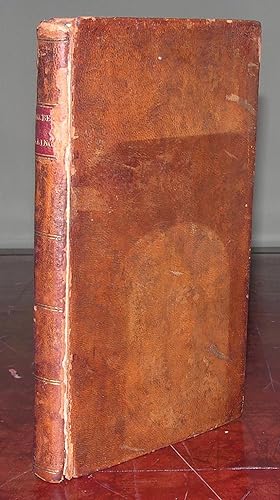Descripción
8vo., bound in 6's (7 ¼ x 4 ½ inches). 2-page publisher's Advertisement (a bit spotted throughout). Fine folding engraved frontispiece map of the United States with original hand coloring in outline (small puncture on upper right, short tear near mount, affecting the image); folding engraved map of "English Prairie and Adjacent Country," both by John Melish. Contemporary full sheep, the smooth spine in six gilt-ruled compartments, red morocco gilt lettering piece in one (joint cracked but holding, extremities worn with some loss). Provenance: From the distinguished library of Wolfgang A. Herz, his bookplate on the front pastedown. His sale, Christie's 12/9/2009, lot number 188. First edition. Containing two maps by John Melish (1771-1822). In the same year this book was published, Melish produced his very important "Map of the United States with the contiguous British and Spanish Possessions," the first map to show Illinois as a state. "A man who chafed at his inability to vote or hold public office, and at paying tithes, Birkbeck had a vision of founding a colony in republican America. Following his father's death in 1816, he emigrated at the age of fifty-three with four of his children to Virginia, where George Flower had bought land. Birkbeck had other ideas, and announced that he intended to settle north of the Ohio River because of his profound hatred of slavery. "After arriving in Boltonhouse Prairie in Edwards county, Illinois Territory, in the summer of 1817, and immediately purchasing about 1500 acres, Birkbeck published in 1818 both an account of the journey in 'Notes of a Journey from the Coast of Virginia to the Territory of Illinois' and an enthusiastic invitation to others to emigrate to his projected colony in 'Letters from Illinois.' Written in plain but lively prose that masked the underlying Romanticism of his message, the second book in particular praised the natural beauty of the prairies and the ease with which they might be cultivated. The two books received an astonishing reception not only in Britain but also on the continent of Europe. The fierce controversy they aroused in the press, journals, and pamphlets on both sides of the Atlantic magnified their impact. During the next few years, the 'English Prairie' became a required stop for British travellers in the west, who in turn published differing assessments. The fame of Birkbeck's pioneering venture undoubtedly contributed to the rise in emigration during the hard times and political repression of the post-war period. "At one time scholars gave Birkbeck credit for recognizing the agricultural potential of prairie land, but there is no evidence that he cultivated the grassland. Although he presented ideas on ditching and fencing in his presidential address in 1823 to the first agricultural society in Illinois, his methods were not adopted. Above all, the projected colony failed to prosper. His hopes of founding a morally upright community were shattered when he learned of George Flower's adultery. He severed completely all communication with his wealthier partners. Even his most severe critics conceded his integrity and the persuasiveness of his pen. Because of his sanguine temperament, he misled himself as he misled others. He did none the less secure an honoured place in the history of Illinois. His newspaper articles and a pamphlet under the pseudonym Jonathan Freeman helped turn the vote against calling a special convention to amend its constitution of 1818 to legalize slavery" (Charlotte Erickson for DNB). N° de ref. del artículo 72MMS83
Contactar al vendedor
Denunciar este artículo
![]()


